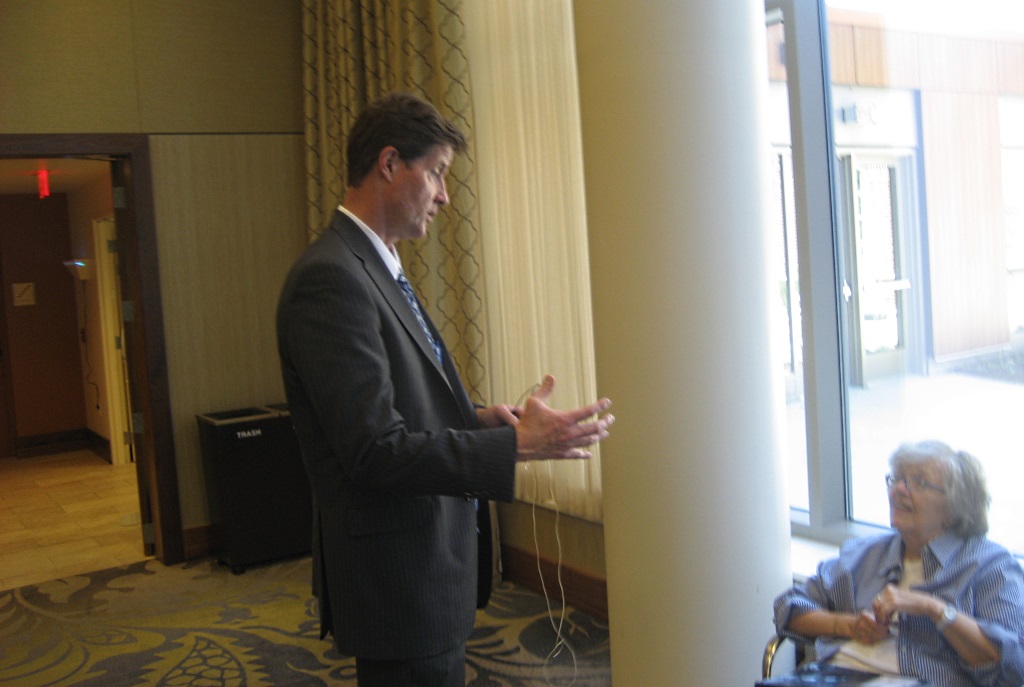The John Chisholm Road Show
He discusses his handling of crime, staff turnover and that "partisan witch hunt."
Supporters of Milwaukee County District Attorney John Chisholm have been worried. There were predictions that conservative groups supporting his opponent Verona Swanigan would spend as much as $1 million on the critical August 9th primary election (there is no Republican candidate running in the general election). So far, however, there has been no sign of such spending, perhaps because Swanigan has committed a series of unforced errors.
Nonetheless, Chisholm is taking no chances and today speaks at the downtown Kiwanis Club. He was originally supposed to debate Swanigan but she withdrew from the event.
While we won’t be attending the Kiwanis speech, we got a preview of the DA’s message at a different event. Chisholm has been spreading his message at a variety of community forums. He appeared at St. John’s on the Lake, 1840 N. Prospect Ave., on Monday, July 18th where he made remarks to an attentive audience of over 60 voters.
His appearance was arranged by resident Gene Gilbert, who has brought a roster of Democratic party public officials to the senior living facility. Chisholm joins the ranks of Tammy Baldwin, Russ Feingold, Gwen Moore, Chris Larson and many others who have heeded Gilbert’s invitation.
The subject of the speech was to have been John Doe investigations in Wisconsin, and Chisholm eventually got around to that charged topic. But in the wake of recent police shootings and shootings of police, Chisholm started his talk with the front page news.
Chisholm said “the relationship between the community and the law enforcement that serves that community is on people’s minds,” due to the recent tragic events.
“Things remind them of the turmoil that took place in 1968,” during a period of great civil unrest that would have been known to the mostly octogenarian audience. That was the year before Chisholm’s predecessor E. Michael McCann began his unprecedented 38-year term as D.A. before handing over the reins to Chisholm, his hand-picked successor.
During that year, the Presidential Commission on Crime set the “tough on crime” framework we still use today in law enforcement, he said.
That framework should be changed, he said.
Under the framework, “social ills became the responsibility of the police and were brought to the criminal justice system — the police, prosecutor, courts, corrections.
This began the process that “brought an increased number of people into our jails and prisons,” he said.
At about the same time, and with much less publicity, we began “removing people from mental health institutions,” which were “not good places to be.”
However, the promised social service programs designed to treat the mentally ill and the addicted were never adequately funded. “We were not putting resources into mental health,” Chisholm said. As a result, we had more people in prison — more per capita than any other country — and fewer in mental health programs. The prisons began filling up with the mentally ill. Mental illness was criminalized. Meanwhile, “a fundamental tension between certain parts of the community and certain parts of law enforcement” was exacerbated.
“We tried to deter crime by putting people in prison,” Chisholm said. “But taking people off the streets and prosecuting them has never shown a correlation with reducing crime,” he said. This is particularly true for the non-violent crimes that are overwhelming our justice system at all levels.
So now, we have seen “decades of concentrated adversity” in certain neighborhoods of the community. There are education, environmental issues and other concerns.
The “distrust between police and residents is based on historical reasons. Historical examples and experiences that are very real” to those affected, he said.
“When children are more exposed to violence, you know the impact that has,” he said. “Imagine growing up in this context. … You have a heavily traumatized community that is also heavily armed. … We are awash in a sea of firearms right now.” Not only has the number of guns increased, the nature of the firearms has changed. They are more powerful and can fire many more shots more quickly.
Chisholm says he has talked to groups of kids in juvenile detention. “How many knows of somebody who was shot?” he would ask. All hands would go up. Chisholm would show photographs of the most commonly used weapons. “Who knows these firearms?” “All knew “even the make, model and serial number,” Chisholm said. “The firearm violence problem in Milwaukee is almost entirely young African American males,” Chisholm said. Most of them live in zip codes like 53205 and 53206 where women greatly outnumber men, largely because the men are in prison.
in 2001 he used a little trick straight out of a child psychology experiment to gauge the youths’ experience with crime, and their perception of its ubiquity. He would ask the kids how many people they thought died in homicides the year before. The kids would guess “1,000 – 2,000 people,” Chisholm said.
In that year 120 people were victims of homicide in Milwaukee.
Answers Critics
The day of Chisholm’s appearance at St. John’s coincided with the debut of a radio advertisement for his opponent, Swanigan has criticized the DA for the turnover in his staff. Chisholm said that when he entered office he had 130 assistant district attorney (ADA) positions funded. That number is now 120. With the inclusion of “absolutely critical” support staff, including investigators and victim assistance personnel, he runs an office of 160 with a budget of $25 million. Keeping a talented staff is a challenge, Chisholm says, with starting salaries for ADA positions at $50,000 per year, or “what a policeman would make in his second year on the job.” Furthermore, the typical new ADA comes saddled with considerable college debt that “equals a mortgage payment,” each month, he said. “They’re making $50,000 and they have $150,000 in debt.”
Since taking office, Chisholm has hired 105 ADAs he said. “Last year I hired 18,” he added. The nature of prosecution is increasingly complex, he added. with computers, DNA evidence and other technologies changing his business model. The successful operation of his office requires “experience, commitment, skill and approach.”
Chisholm also pointed out the administrative aspects of the job, which, like running for election, entails a bit of fundraising.
“The entire domestic violence unit is funded entirely by federal dollars,” he said. Each year his department receives a total of $3.5 million in federal grants “that I have to go and get.”
About John Doe
Chisholm was asked about the John Doe process, which is used in Wisconsin for investigations into possible crimes. Chisholm famously made use of the tool in an investigation of Scott Walker‘s county executive office and later of his gubernatorial campaign. John Doe I, as it was called, resulted in six convictions; John Doe II was shut down by the Wisconsin Supreme Court before it was completed — a decision that has been appealed — and earned him the enmity of wealthy conservative activist Eric O’Keefe, who is assumed to be backing Swanigan.
John Doe has been used in Wisconsin since the 1850s, Chisholm said. It is an investigatory tool much like a Grand Jury, but it is done before one judge instead of a panel of citizens. “You can have an attorney to consult with in a John Doe,” Chisholm said. “You don’t have that with a Grand Jury.” Since the proceedings are secret, people who are investigated are not named if no charges result. This anonymity was seen as an advantage of the system, since it did not tarnish the reputation of innocent parties.
“I used the John Doe (in these cases) to get testimony locked in. Otherwise they could disappear or be dead.”
Chisholm said money changed politics in this state, and he used the John Doe process to investigate possible irregularities in campaign finances. But since a DA can only do a John Doe in his own jurisdiction, Chisholm invited other DAs in other counties to join in with his investigation when it became involved in their areas. He received bi-partisan support, he added, with Republican and Democratic DAs joining the investigation.
Conservatives like O’Keefe, however, called the probe “a partisan witch hunt,” and the Republican dominated legislature passed a law forbidding the use of John Doe investigations in political cases.
But John Doe II came before that statutory change and Chisholm vowed to continue his challenge of the state Supreme Court decision “even if it makes me deeply, politically unpopular.”
No Higher Ambitions
Chisholm was asked if he planned to run for higher office at some point.
“I have no ambition to run for higher office. I am not by nature or inclination a politician.
“Maybe this is why I get into so much trouble.”
Plenty of Horne
-
Milwaukee Modernism Gains National Awards
 Dec 15th, 2025 by Michael Horne
Dec 15th, 2025 by Michael Horne
-
New Rainbow Crosswalks Mark Milwaukee’s LGBTQ+ History
 Oct 8th, 2025 by Michael Horne
Oct 8th, 2025 by Michael Horne
-
Welcome Back, Tripoli Country Club!
 May 27th, 2025 by Michael Horne
May 27th, 2025 by Michael Horne






















Excellent article Michael.
Well done.
The proposed reduction of a Class B repeated sexual assault of a minor (3 year old daughter by Father) to a couple of misdemeanors in Milwaukee 2015CF3592 does not match a quite a statement like “When children are more exposed to violence, you know the impact that has,”. But the victim doesn’t live in MKE so why should the MKE system care eh?
Jack, what’s your point? I’m lost here.
You failed to mention your buddy Eric Peterson’s role in trying to defeat Chisholm. Why is that?